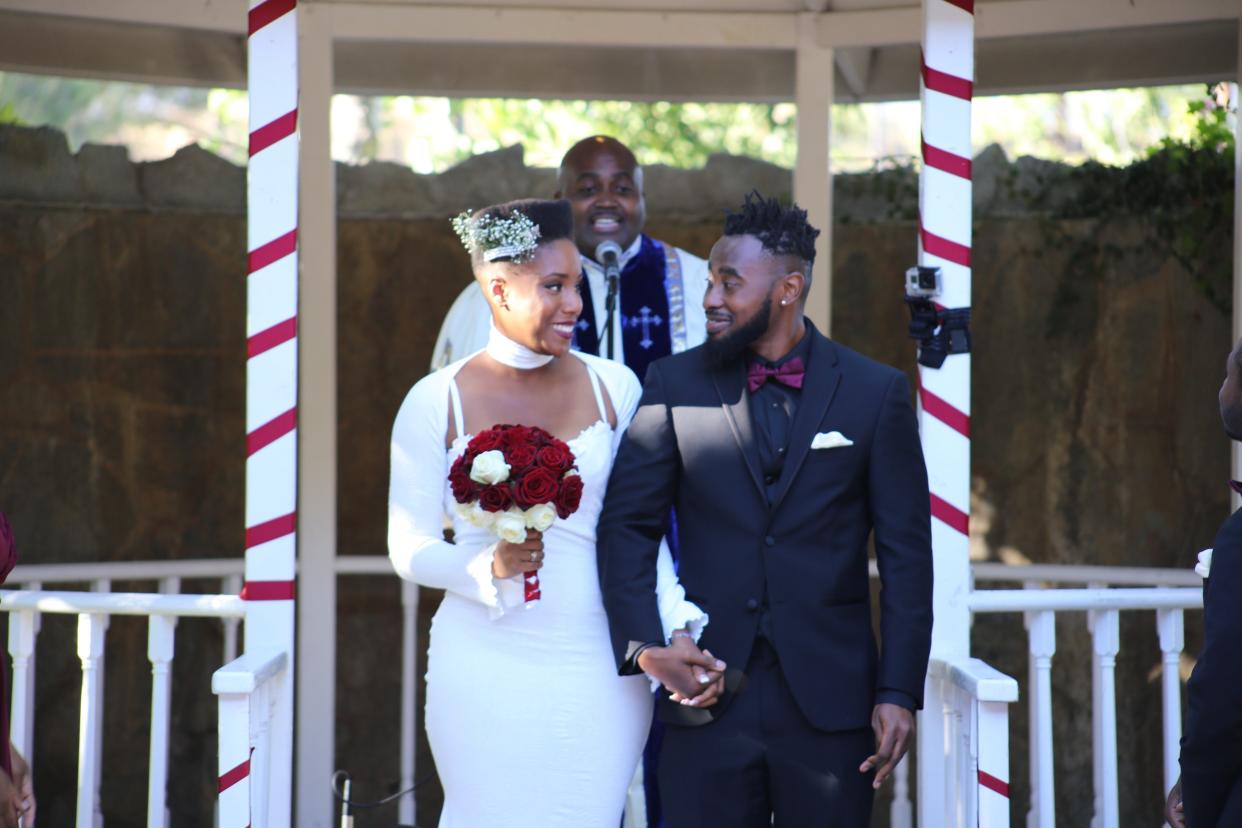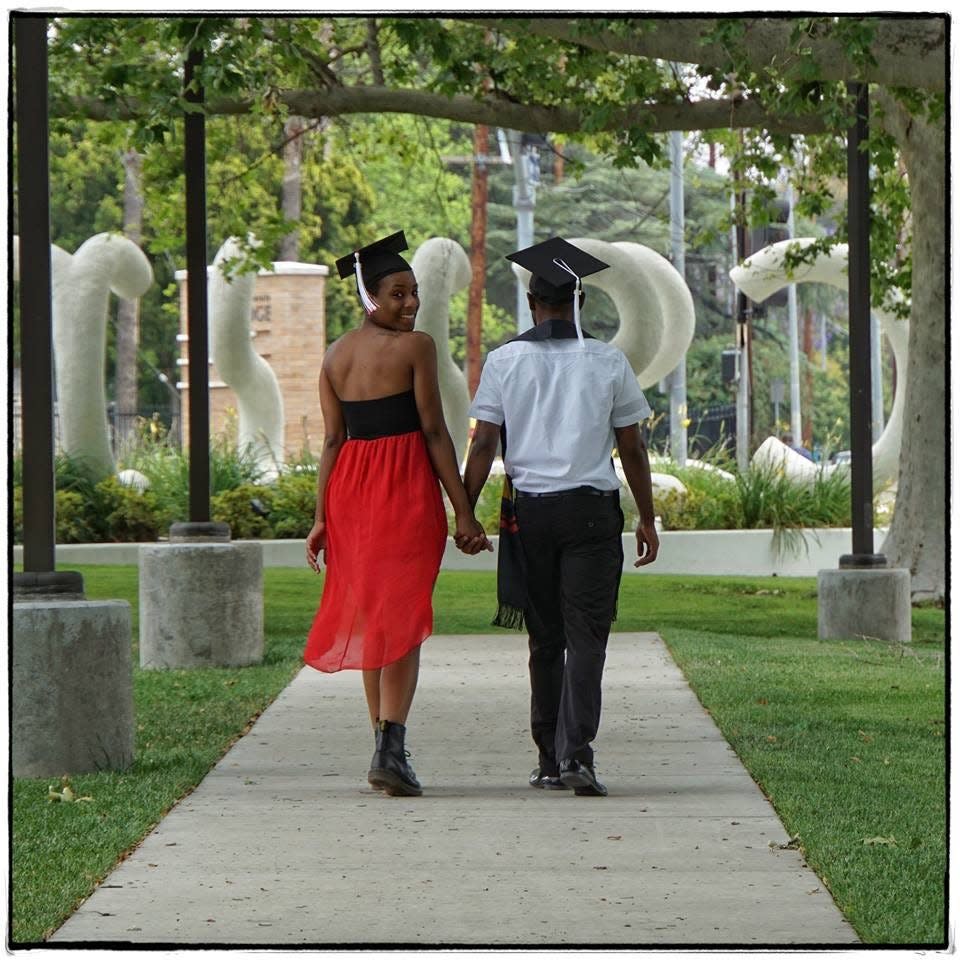This Is America: I'm Black. I'm married. And systemic racism is making me rethink having kids.

Hey, hey! Welcome to the "This is America" newsletter centered on race, identity and how they shape our lives. I’m your temporary hostess of words, Jasmine Vaughn-Hall, a reporter for the York Daily Record in Pennsylvania.
We all know the K-I-S-S-I-N-G song — first comes love, then comes marriage, and then comes the baby in the baby carriage.
Here's my version: Well, there I was minding my own business in a college class when in walks this cute guy. I was a junior and I’d never seen him on campus before. This stranger would become my friend, my boyfriend, and eventually my husband. Hats off to the universe and timing. For real. I knew we were in this for the long haul the first time we shared tacos. (I never share tacos.)
Now, we’re headed toward that third part of the nursery rhyme, but it’s not without hesitation.
Don’t get me wrong — I love my husband. We've been married almost five years, and miniature versions of us running around would be dope, but there are forces out of our control that directly affect my hype to have kids.
But first: Race and justice news we're watching
Important stories of the past week, from USA TODAY and other news sources.
NFL to use all-Black officiating crew for first time ever on Monday night for Rams-Bucs game
American Medical Association House of Delegates: Racism is a threat to public health
Lucille Bridges, mother of activist Ruby Bridges, dies at 86: Lucille Bridges walked with her then-6-year-old past crowds screaming racist slurs as she became the first Black student at her all-white school.
With Black Friday around the corner, Facebook's new initiative #BuyBlack Friday aims to bolster Black-owned businesses during a crucial time for holiday sales.
Real talk: I'm scared to be pregnant
The truth is that because of my race and gender there are already odds stacked against me and my journey to motherhood. Black women are dying in childbirth 2.5 times more often than white women, according to data from the National Center for Health Statistics.
It doesn't matter how many hours we've spent imagining our future child's face during late-night conversations on the couch, arguing over whose eyes they'd have. There's a morbid cloud of stats to rain on our parade.
Approximately 700 women die from pregnancy-related complications in the U.S. each year and 60% of them are preventable.
A Centers for Disease Control and Prevention report that analyzed national data on pregnancy mortality between 2007 and 2016 revealed that Black women with at least a college degree (that's me) are still 5.2 times more likely to die than their white counterparts.
Pregnancy-related mortality ratios for Black, American Indian and Alaska Native women 30 or older was about four to five times greater than white women.
Racial disparities exist, and I just don't have time for it.
What does systemic racism in health care look like?
One Black woman — with a history of stillbirths and diabetes — was recommended fried chicken by a nutritionist when she asked for a high protein snack option.
Another died at the age of 26 after an emergency cesarean. Days before, she tweeted that she had "incompetent doctors" and couldn’t wait to write about it. These are only a few instances from a Rockland/Westchester Journal News article by Swapna Venugopal Ramaswamy published in September, exploring "the dangers of being Black and pregnant."
As beautiful as it is to bring a little human into the world, it is taxing on the body. That’s why there’s months-long planning involved with the process, which should include having a transparent and trusting relationship with your doctor.
Anything could go wrong when you are in labor and after the fact. Serena Williams, one of the most athletic women in the world, had complications after having her daughter Olympia in 2018. And, even though Williams eventually got the care she needed, nurses initially thought that she was just "confused" about her symptoms.
"Every mother, everywhere, regardless of race or background deserves to have a healthy pregnancy and birth," Williams wrote in an op-ed for CNN.
The list of cases is long: Black women often are not given the courtesy to depend on doctors or nurses to believe them when they say they are in extreme pain or something doesn't feel right.

My so-so silver lining
I'm not ashamed to say I'm Black, married, and borderline petrified to have kids because of the systemic racism that exists in the American health care industry.
Racism is a disease that I'm only susceptible to because of the color of my skin. Read that again. Sounds crazy, right?
I want to be a mother. I want to place my hand on my swollen belly some day and feel "them" kick (because my husband oh-so casually told me that twins run in his family). I want to say see you soon in that final stretch of pregnancy without the lingering afterthought that maybe I won't.
All is not lost, though. The American Medical Association recognized racism as a threat to public health and has adopted new policies. In other words, folks in the white coats are telling racism to kick rocks.
There are also organizations like the National Black Doulas Association that advocate for pregnant Black women to fight the maternity mortality rate. Nothing like a sis helping another.
It's time to change the narrative and the nursery rhyme. First comes love, then comes marriage and then comes a Black couple refusing to be intimidated out of parenthood.
Oh, and somewhere in that remix, my uterus and ovaries are chiming in with the "not today, racism" chorus.
--
Jasmine Vaughn-Hall is a reporter for the USA Today Network in central Pennsylvania. Contact her at jvaughnhal@ydr.com, 717-495-1789 and follow her on Twitter @jvaughn411.
Next week: Eryn Dion speaks with Wampanoag Native Americans about the legacy of Thanksgiving.
This is America is a weekly take on current events from a rotating panel of USA TODAY Network journalists with diverse backgrounds and viewpoints. If you’re seeing this newsletter online or someone forwarded it to you, you can sign up here. If you have feedback for us, we'd love for you to drop it here.
This article originally appeared on USA TODAY: This is America: Systemic racism in healthcare is crippling my want for kids

